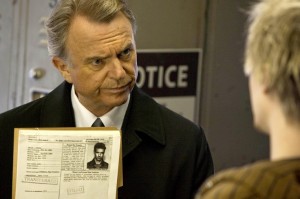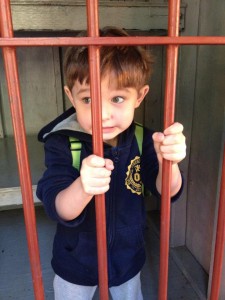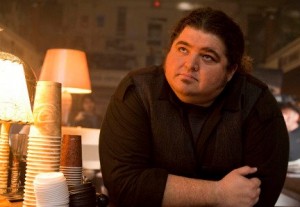One of the things that most Lost wannabes fell short on was the big splash in the first ten minutes. When the inciting mystery of The Event could be figured out just from the marketing in the months before the show aired, that doesn’t really bode well for mystery fans. Threshold, Surface… there was so much odd stuff happening before I knew anything about the characters it was just hard to see anything in it other than show runners trying to parse why everyone loved Lost so much. It’s the smoke monster and the time travel and onion-layer of the mystery, right? Where those previous shows missed the boat is obvious: they were trying to replicate the commercial success of Lost without understanding why the story resonated with the audience, first.
It seemed to me that all the folks trying to duplicate the success of Lost didn’t watch the pilot, much less the first two seasons. The reason Lost connected with such a wide demographic is because it only asks you to buy one thing, initially: a bunch of pretty people survive a plane breaking in half at 36,000 feet and land relatively unscathed on an uncharted island. The two-hour pilot is practically the game show Survivor by way of Gilligan’s Island. There’s an entire episode of the first season completely predicated on who possesses an asthma inhaler. That’s out-of-the-box for network drama, and that’s why it was successful. The other attempts were just trying to fill the Lost box, and that’s why they weren’t. Oh, we’ll give it to FlashForward in terms of the big splash in the first ten minutes, with the world-wide wreckage caused by everyone being catatonic for a minute nineteen or whatever it was, seen through thin characters on the ground to be the audience in. But the show didn’t follow-up with any sort of urgency, and casting the Hobbit from Lost as a bad guy seemed a little too arch and marketing-driven to be any organic part of the entertainment.
But then comes last night’s Alcatraz… Just after Sam Neill’s initial voice-over, I was hooked. They didn’t spend two million dollars on a pilot, making a plane crash on the beach in full-scale. They didn’t have shapely ingenues in bikinis resting comfortably with aviation fuel burning in the background; they didn’t have earnest, squared-jawed heroes facing off to battle for affections or to promote philosophy. They made their first big splash with just this:
“On March 21st, 1963, Alcatraz officially closed. All the prisoners were transferred off the island. Only, that’s not what happened… not at all…”
I mean, come on. That’s up there with Star Trek‘s mission statement, “Steve Austin; a man, barely alive…”, and the beginning of The A-Team. I can’t remember when a show’s voice-over so instantly made me interested in what-happens-next while simultaneously presenting the premise of the show. And in 23 words! That’s a gemstone-quality bit of writing.
And you can tell the creators of Alcatraz, Steven Lilien and Bryan Wynbrandt, must have been big fans of Lost because it’s clear they didn’t look at the show to try to duplicate its commercial success, but rather looked at it and reverse-engineered the recipe of why people liked it. And people seemed to dig on my format of Lost observations well enough, so I’m going to continue, for ease of discussion:
1. Sam Neill is awesome, whether he’s playing lead in a European examination of various SF tropes, an avuncular father figure in the midst of living dinosaurs, a scientist that might possibly be out of his element, or an unstoppable cop on one of the most transparent cases he’s ever been on. How incredibly, unbelievably cool for an actor to get to play all of these emotions and drives in one character on one show. I very much enjoy how his Emerson Hauser is the good guy, with motives based on justice long-deferred… who is also a ruthless jagoff in his methods, shown when he head-butts sympathetic killer Jack Sylvane at the end of the first episode.
2. And speaking of “Jack Sylvane,” how cool was it to see a guest-star, ostensibly the “perp-of-the-week,” show up in his cell in NeoGeo (or whatever they’re calling the new Cellblock D-designed-by-Apple in the woods) to be interrogated the next ep? I thought that was a wonderful conceit to try to address anticipated criticism: that this show isn’t just an endless police procedural, tracking down bad guys interlocked thematically; all these guys knew each other on The Rock fifty years ago so it makes good story sense to be able to go back and get intel on motive and abilities from previously-captured time-crooks.
3. I like the spoonfuls of mystery they doled out the first two eps; whatever’s going on has a purpose and seems science-based. Although the returnees have no memory of what happened to them or why, they return with specific objectives and with a small amount of knowledge of modern times. Jack has no trouble navigating a modern gym and locker/key use (Number Eight; another obligatory Lost nod); Cobb has got prepaid credit cards and hotel keys and other gear. Even the flashback blood-draw scene has a mysterious nod to perhaps a science experiment: “That’s a lotta blood from a guy who ain’t sick.”
4. Like the Lost “whoosh” would signal a scene change or cut-to-commercial, and the audience would get the heady notion that they’re flying from one time period to another, or from one thematic note to another, this one has the changing shut of cell doors, trapping the audience in the scene or the mood. Or, conversely, the opening of the cell doors, indicating a freeing of the audience to experience the next part of the narrative, or at least a tonal mood-cleanser. See what they did there? I think that effect is a little precious, though, and might become a little grating after a while. Heh.
5. Criminally underused, I’m just glad Robert Forster is in this show.
6. Just as I gave the producers of FlashForward crap casting the Hobbit from Lost as a bad guy as it seemed a little too arch and marketing-driven to be any organic part of the entertainment, so I completely applaud the producers of Alcatraz for casting Hurley as the nerd-audience-in which works here for the exact reasons it didn’t in FlashForward. Critics who find this sort of thinking hypocritical are invited to enjoy two of my four-and-a-half year old’s insults: “you all can smell my tushie,” and “I hope you get an ear infection,” two of the worst things he could wish on anyone.
7. More numbers: the “8” on the locker key; one of Doc Soto’s jailhouse books: “Alcatraz: By The Numbers;” the inmate designations, Sylvane #2024, Madsen (the detective’s grandfather) #2002 (and how notable Sylvane and Madsen shared a scene but never saw each other)… but Cobb’s inmate number wasn’t revealed? Coincidence? Is anything in a JJ show?
8. Of course, the bit I appreciated the most is when the audience sees that Lucy, the main assistant to Hauser in the pilot… was also in Alcatraz in the 1960s as a psychologist. So a main cast member is also a returnee as well. Is it a bit arch she’s trying to find out what’s happening? Shouldn’t she remember, if she’s one of the good guys?






2Comments
Pingback: The Best TV Shows on TV - Sittin' Here with Just a Mustache and Memories | Spunkybean
Pingback: Alcatraz Revisited - "Pilot" | Spunkybean
Comments are closed.